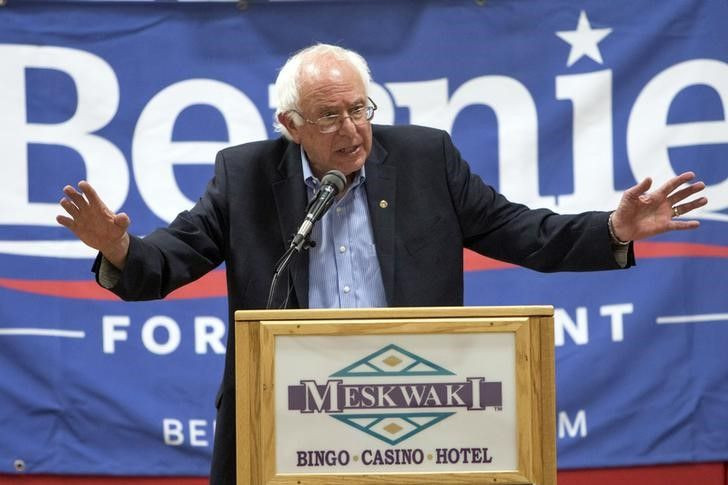Inside Bernie Sanders' Strategy To Win Over Organized Labor

(Reuters) - Union activist Cliff Smith once thought of Bernie Sanders as an "obscure" U.S. senator. That changed in August when Smith joined 27,000 people to hear the Democratic White House candidate speak at a Los Angeles sports arena.
"The other candidates - they talk in these very calculated, milquetoast, vague ways - they just don’t come across as human," said Smith, the business manager for Local 36, a branch of a roofers’ union. "He just seems like your next-door neighbor."
Sanders' vow to protect American jobs and rein in big corporations has resonated with union workers such as Smith. Sanders, who is challenging Hillary Clinton, the front-runner for the Democratic presidential nomination, has put the courtship of organized labor at the heart of his fight.
Reuters interviews with dozens of activists and union leaders reveal an unusual Sanders union strategy that can be summed up in one word: Stall.
Rather than pressing for endorsements, the pro-Sanders group Labor for Bernie is asking national unions to at least stay neutral for now. They hope this will buy time for Sanders to convince labor he is electable in the November 2016 presidential election.
Sanders' supporters say strong showings in the debates and early primaries will demonstrate his viability and bolster his support. That, in turn, would put him in a stronger position to push for endorsements.
Still, said Sander's Iowa state director, Robert Becker, it will be on-the-ground organizing, not national endorsements, that will be crucial in getting workers to take part in the early Iowa and New Hampshire nominating contests.
Union Power
In trying to win over union members, Sanders’ supporters argue that he is better able than Clinton to represent labor’s positions on issues such as trade and the minimum wage.
Union endorsements would give Clinton and Sanders both a symbolic and a practical boost given labor’s traditional role in raising money and mobilizing voters for the Democratic Party.
Clinton leads Sanders for the Democratic nomination, 46 percent to 24 percent, in a Reuters/Ipsos rolling five-day poll ending Sept. 4.
But the Vermont senator is making inroads in Clinton's union support. When she won national endorsements from the American Federation of Teachers and the International Association of Machinists and Aerospace Workers, many rank-and-file members took to Twitter and Facebook to express their dismay and voice support for Sanders.
Sanders so far has gotten one national endorsement, from National Nurses United.
Over Labor Day weekend, Clinton and Sanders will court union workers at picnics and parades in Iowa and New Hampshire.
They are intensifying their efforts as national unions such as AFSCME, dominated by public-sector workers, prepare for autumn meetings to consider whether to formally endorse one of the Democratic candidates.
"I’m looking for additional endorsements as we go forward," Clinton told reporters in Puerto Rico on Friday. "I’m not taking anything for granted. I’m going to work hard to win as much support as I possibly can."
Meanwhile, Labor for Bernie is urging AFSCME and other national unions to put the brakes on formal endorsements. Petitions are circulating, including one to the Service Employees International Union, which has 2 million members, urging leaders to stay on the sidelines for now.
'Terrain Has Changed'
Ed Hunt, an SEIU leader in Salem, Oregon, who supports Sanders, said the strategy may be bearing fruit. Hunt once thought it was inevitable that Clinton would get a formal backing from SEIU, which represents waiters, hotel maids and other service workers. He does not think so anymore.
“I think that the terrain has changed,” Hunt said.
Clinton's cautious stance on a Pacific trade deal that the Obama administration is pursuing has cost her some support from union workers who fear the Trans-Pacific Partnership will destroy U.S. jobs. Dozens of union activists interviewed by Reuters expressed unhappiness with Clinton, who has declined to take a stand until the TPP is finalized. Sanders opposes the deal.
“Hillary Clinton is working hard to earn the support of the working men and women of labor because they share a common commitment to a working families agenda that makes the economy work for every American, not just those at the top,” Clinton campaign spokesman Jesse Ferguson said.
Sanders has spent decades building union ties. He walks picket lines and attends luncheons. Each year, he celebrates his birthday on a sunset lake cruise socializing with union members and other activists from his state, who pay $25 each.
“We’d all sing happy birthday to Bernie. Bernie would talk 15, maybe 20 minutes, then there’d be dancing,” said Dennis LaBounty, political director of the Vermont State Labor Council. “And he’s done that for 15, 16 years.”
One question mark that looms is whether Vice President Joe Biden will jump into the fray and seek the Democratic presidential nomination.
Many Sanders supporters say a Biden candidacy would work in their favor, creating a further incentive for national unions to hold off on endorsements just yet.
“Noise from Biden also has a chilling effect on endorsements for Hillary, which is good for Bernie,” said Rand Wilson, spokesman for Labor for Bernie.
But Smith and his Local 36 have already committed to Bernie – and he is urging other unions to do so.
“We need to join forces and push our agenda into this election, and Sanders’ campaign is the best vehicle to do that,” he said in a letter urging other locals to support Sanders.
© Copyright Thomson Reuters 2024. All rights reserved.







